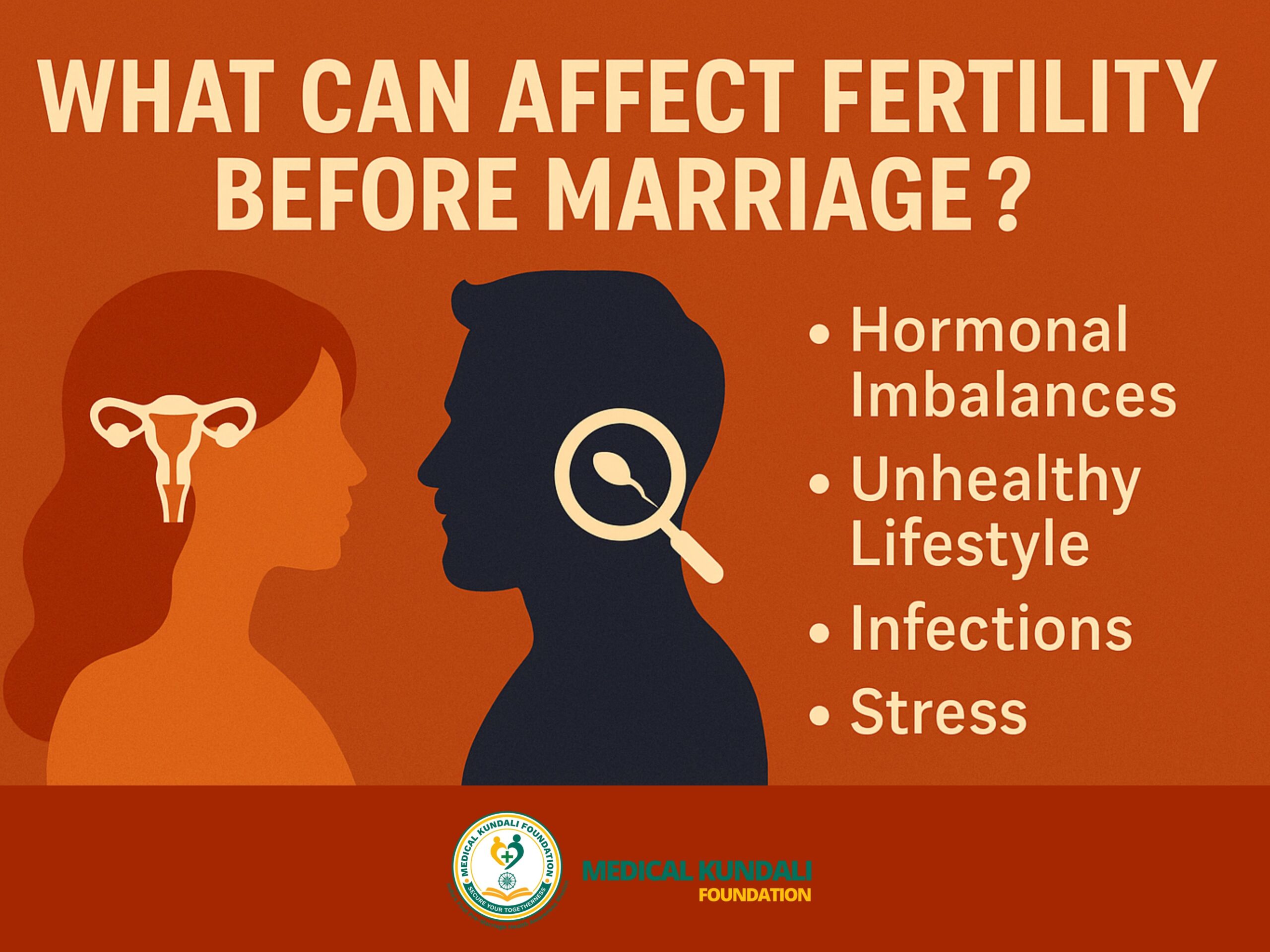- November 18, 2025
Table of Contents
ToggleFertility Is a Health Conversation, Not a Marriage Milestone
In many Indian homes, couples are expected to start a family soon after marriage.
But the truth most people never hear is simple: fertility is not guaranteed.
It is a health variable influenced by unseen biological, lifestyle, genetic, and emotional factors long before the wedding day.
Fertility challenges are not rare. They are not limited to women. And they are not always linked to age.
Understanding your fertility before marriage is not fear-driven; it is responsible, informed, and deeply empowering. At Medical Kundali Foundation, our experts outline the lesser-known factors that impact fertility and how early screening can prevent future stress for both partners.
India’s Fertility Reality: What the Numbers Reveal
-
One in six Indian couples faces infertility
-
Nearly half of infertility cases are due to male factors
-
Most discover the problem only after one to two years of trying
-
Delayed testing increases emotional and financial burden
-
IVF costs begin at ₹1.5–3 lakh per cycle, with no guaranteed results
Most of these struggles can be reduced, or entirely prevented, through early awareness before marriage.
What Affects Fertility Before Marriage? Key Factors for Men and Women
1. Hormonal Imbalances
Hormones drive ovulation, sperm production, menstrual cycles, and overall reproductive capacity. The following conditions can silently affect fertility:
-
Polycystic Ovary Syndrome (PCOS)
-
Thyroid disorders
-
Low Anti-Mullerian Hormone (AMH) levels
-
High prolactin
Many young adults in India experience these conditions but remain unaware until marriage.
2. Lifestyle-Related Risks
Modern urban lifestyles play a significant role in fertility decline. Factors include:
-
Smoking
-
Excessive alcohol
-
Processed and high-sugar diets
-
Irregular sleep cycles
-
Long sedentary work hours
-
Being underweight or overweight
These can influence:
-
Egg quality
-
Sperm count, shape, and movement
-
Hormonal stability
-
Sexual desire and stamina
3. Undetected Infections or STIs
Infections such as chlamydia, gonorrhea, or pelvic inflammatory disease often show minimal symptoms but can cause:
-
Blocked fallopian tubes
-
Scarring in reproductive organs
-
Poor sperm transport
-
Long-term fertility complications
Routine health checks rarely screen for STIs unless requested.
4. Male Fertility Factors
A man’s general health does not always reflect sperm health. Common issues include:
-
Low sperm count
-
Poor motility
-
Abnormal shape
-
High DNA fragmentation
Heat exposure from laptops, smoking, long hours of driving, poor nutrition, and stress are major contributors.
5. Genetic Conditions
Some genetic traits significantly influence fertility and reproductive outcomes:
-
Klinefelter syndrome
-
Turner syndrome
-
Thalassemia minor
-
Sickle cell trait
These conditions are often silent and detected only through focused genetic screening.
6. Mental Health and Stress
High stress levels may interfere with:
-
Ovulation
-
Menstrual regularity
-
Sperm production
-
Sexual function
-
Relationship wellbeing
Mental and reproductive health are closely linked, especially in young professionals navigating demanding careers.
Doctor’s Checklist: What to Test Before Marriage
For Women
-
AMH (ovarian reserve)
-
Thyroid profile
-
PCOS screening
-
Menstrual health evaluation
-
Pelvic scan
-
STI panel (if indicated)
For Men
-
Semen analysis
-
Testosterone (if symptomatic)
-
Scrotal ultrasound (if needed)
-
Lifestyle and fertility risk assessment
-
STI panel (if indicated)
All of these tests are non-invasive, affordable, and typically completed within a few days.
Why Testing Before Marriage Matters
-
Reduces emotional pressure on both partners
-
Builds trust, transparency, and shared responsibility
-
Provides time to explore treatment or lifestyle changes
-
Prevents blame, guilt, and family-related stress
-
Offers peace of mind when results are normal
Early knowledge supports healthier decisions and a more stable future.
How Medical Kundali Foundation Supports Couples
-
Pre-marital fertility awareness programs
-
Hormonal and semen profile packages (launching August 2025)
-
Reproductive education tools
-
Doctor-led counseling for couples
-
Family sensitization initiatives to reduce stigma
Our approach blends medical accuracy with cultural sensitivity, ensuring couples receive clear, compassionate guidance.
Final Thought: Reproductive Health Should Be Understood, Not Assumed
Fertility is not a race or a test of worth.
Whether you plan to start a family soon or much later, you deserve clarity about your reproductive health today.
One step now can prevent years of uncertainty later. Contact us and we will guide you for your fertility screening.
